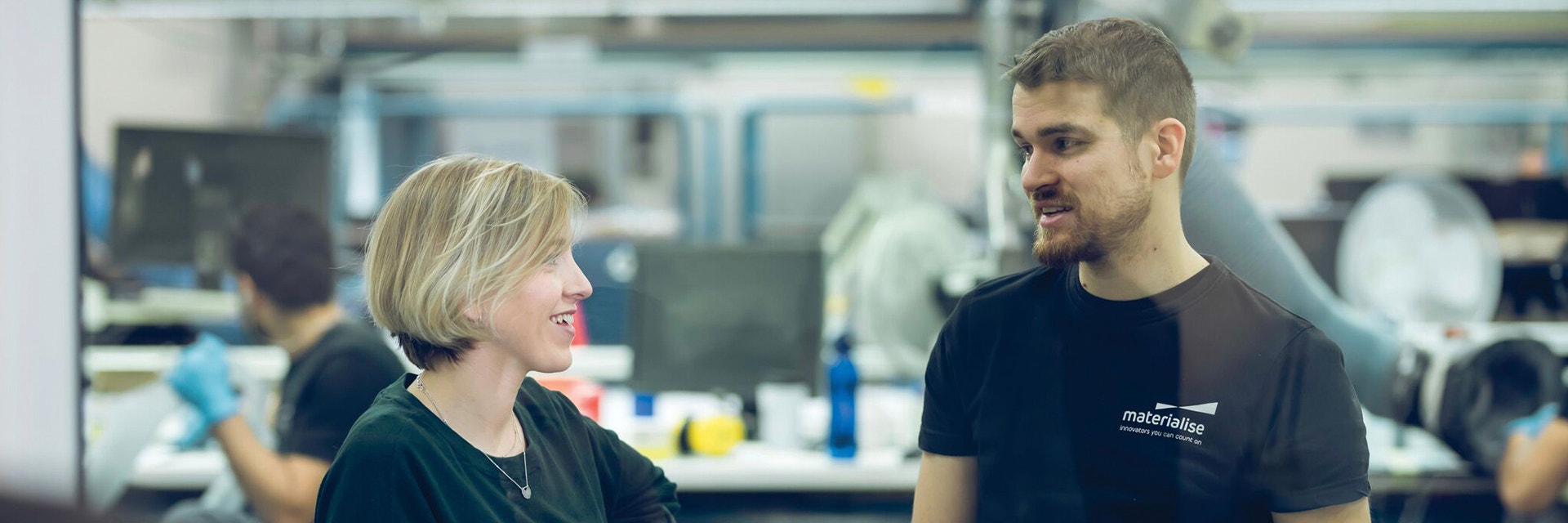EXPERT INSIGHT
The Future Is…Conscious
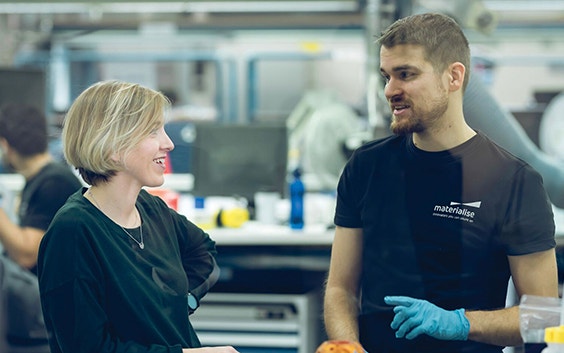
Automation, speed, quality, and cost reduction are all important drivers for improving the 3D printing process, but business isn’t all about money. Employees play an essential role in any factory, and their active involvement and creativity are what lead to solutions. There is also no getting around the fact that, today, responsible environmental practices and sustainability are everyone’s concern and critical to a successful business.
Materialise’s mission has always been to build a better and healthier world for everyone. We believe that we have a responsibility to care for both our employees and the environment, which is why we have integrated both strong environmental principles and human-centered production into everything we do.
As a result of this approach, in 2019, we were recognized as a Factory of the Future by industry platforms Agoria and Sirris. Among the seven key transformations needed to achieve this award were proving a commitment to involve employees in the future of the organization and demonstrating a sustainable production system over all stages of the product life cycle — two things Materialise has always taken to heart.
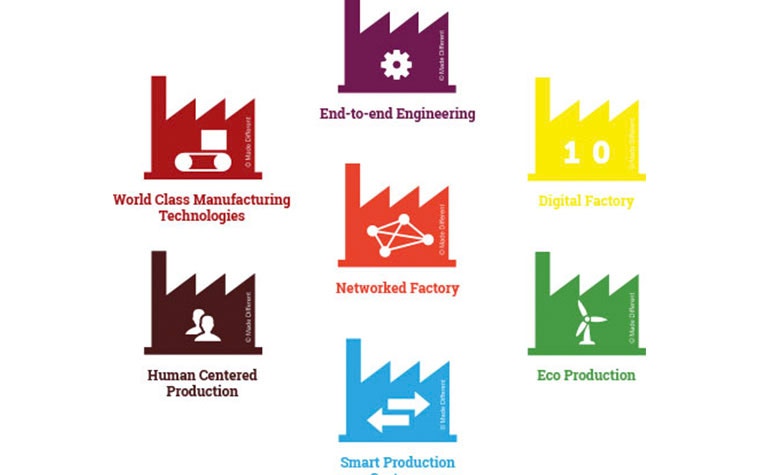

Strategy as collaboration
Here at Materialise, we may work in automated manufacturing, but we’re not looking to automate at the expense of staff. We want employees to be autonomous and play an active role in setting goals for our operations. One of the most important ways we do this is by making sure that the people in production really know what is expected of them and that they have the ability to decide how best to put these expectations into practice.
As Production Director Nico Roose explains: “We cascade input down from the strategy to the targets for a certain year. We then give that to the different teams so they can come up with how they translate that, how they see the strategy and the year objectives for their team, how they could contribute, and what kind of initiatives they could define that could help contribute to the strategy.”
“We’ve done a huge shift in the last two or three years, from pure job skills and competencies to really elaborate on the soft skills needed in the team to become more of a Factory of a Future.”
— Nico Roose, Production Director
This immediate buy-in from teams is critical to make sure that employees are not just completing assigned tasks but are really thinking with the company and feel part of the Materialise culture because they understand what’s behind it and have a say in what they’re contributing to.
Impeccable coordination
To get teams to reach their full potential in developing strategy and solutions, sometimes technical skills aren’t enough. “We’ve made a huge shift in the last two or three years, from pure job skills and competencies to really elaborate on the soft skills needed in the team to become more of a Factory of a Future,” Nico explains. It’s part of a new program Materialise rolled out called “impeccable coordination.”
Impeccable coordination can be best thought of as a set of tools or mechanisms that give staff the skills they need to communicate well. Saying no, timing your communications to get your message across at the right time, proposing alternatives, dealing with change, communicating with customers — it’s all part of a larger focus on continuous improvement. In a culture in which people hold each other accountable and where commitments are taken seriously, there is trust, coordination, and efficiency.
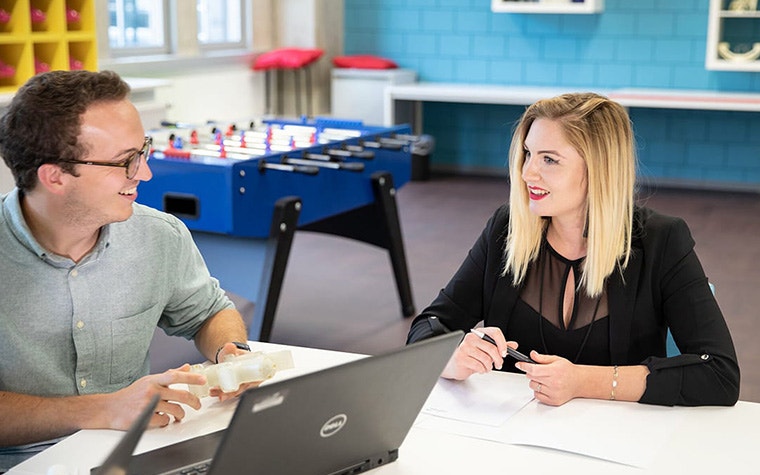

This helps create a strong environment for co-creation, something Nico sees as key in a Factory of the Future: “The meeting and networking aspects are crucial. We always try to have our production plans or our structures aligned to facilitate the informal gathering between people as much as possible, as this is the biggest contributor to fantastic ideas.”
Human-centered production
Giving staff the freedom to come up with ideas and to challenge the status quo has led to technological developments that let Materialise understand the technologies even better. Just one informal conversation at the coffee corner — a staff discussion about how they were unable to understand where build failures came from — turned into a collaboration with the R&D department to create a camera that could be installed directly into the machines. These cameras now allow staff to see the build as it happens through our Materialise Inspector software and, when something goes wrong, to do a full root cause analysis of the problem, boosting effectiveness.
As a Factory of the Future, this approach is really integral to the DNA of our company. We want to provide innovative ways to improve processes so staff can be put back where the human touch really belongs. Through increased automation, instead of wasting time on routine tasks, people are getting the right information at the right time and gaining more control.
This focus is perhaps most evident in our software solutions. We designed the Materialise Manufacturing Execution System to network the full production process, from data preparation all the way through post-processing. This gives staff real-time information at all stages of a build, allowing them to respond when needed and freeing up their time from unnecessary monitoring. Automating as much of the process as we can also allows us to build flexibility for our staff, not just creatively, but personally.
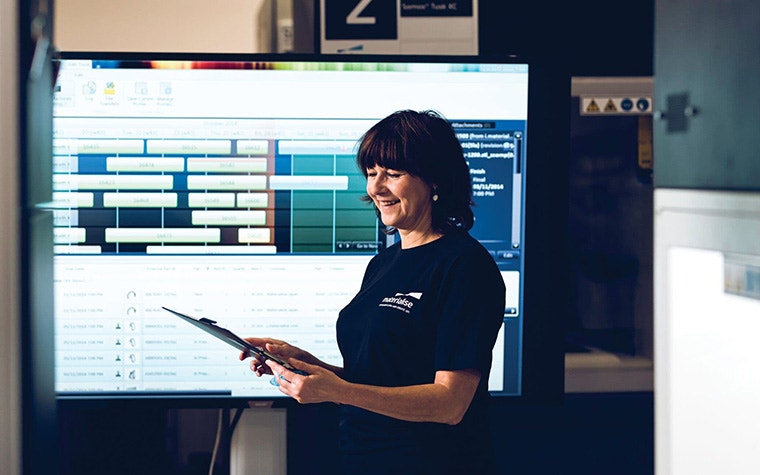

At Materialise, we owe our success to our people, and we know that life exists outside the workplace and doesn’t always conform to a strict 9-to-5 schedule. The nature of blue-collar industrial work often means employees are stuck to rigid shifts, but — as the Factory of the Future auditors made special note of — we try to ensure all employees, no matter what their role, have the possibility of flexible working hours so they can find a balance between private and work life.
Eco-production
When it comes to life outside the office, it goes without saying that without a healthy future for the environment in which we live, there is no Factory of the Future. According to data from the European Environment Agency, between 2010 and 2018, total waste generation increased by 5% (114 million tonnes) in the EU-27. In a high-volume industrial factory such as Materialise, minimizing our environmental footprint can be an important contributor to reducing this impact.
As the first 3D printing company to sign on to the UN Global Compact, we’re making it a priority to integrate strong environmental principles into our entire manufacturing and design processes.
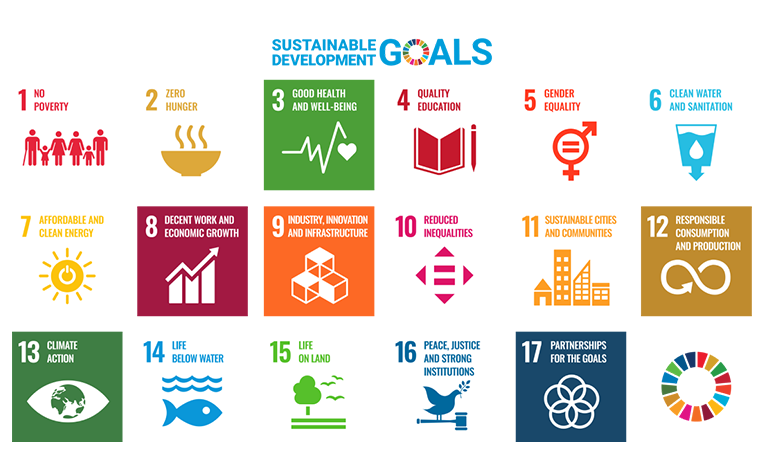

3D printing already offers advantages in saving resources because, by its very nature, it is a material-efficient manufacturing process. But more than that, our software solutions are continually being refined to help design products that use less material and are printed in a way that minimizes the number of support structures, all while maintaining needed strength and functionality. By using new paradigms in our approach to design, a project like the FIX3D bike frame not only improves on the strength of typical metal frames through a low-material lattice design but also saves energy because it can be printed as a single part.
Whether it’s working with innovative natural materials, integrating functional parts, or using simulation software to optimize builds and reduce the number of pieces that fail — we’re exploring it all.
Materialise has committed to ongoing environmental stewardship, and our ISO 14001 certification holds us accountable. We’re constantly looking at how to reduce raw material usage and improve waste disposal and recycling, but also at broader solutions such as encouraging environmentally friendly commuting through our bike leasing program and electric vehicle stations.
And it’s not just for our own factory — the efficiency improvements that come through integrating our production solutions into your workflow mean your environmental footprint automatically improves as well.
As Factories of the Future, we can all lead the way through continual improvement and harnessing the power of innovation, not just for our businesses, but also for our people and the planet.
Share on:
You might also like
Never miss a story like this. Get curated content delivered straight to your inbox.
